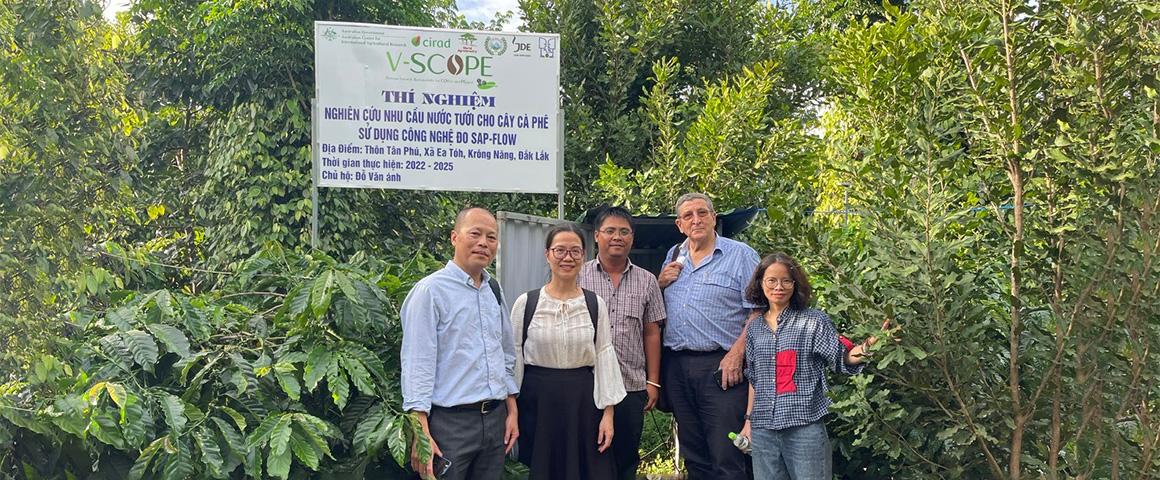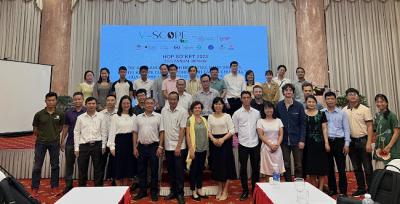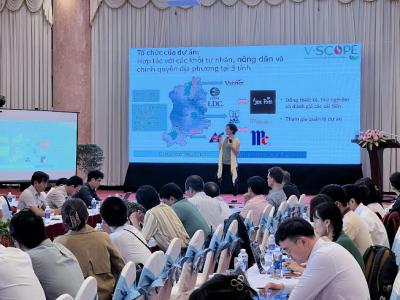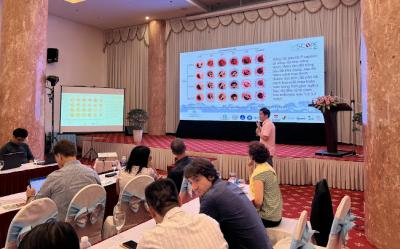- Home
- Worldwide
- Our regional offices
- Continental Southeast Asia
- News : Continental Southeast Asia
- V-SCOPE 2023 in Review
V-SCOPE 2023 in Review: Transforming Coffee and Pepper Farming in the Central Highlands in Vietnam

Dr Howard Hall, ACIAR's Special Advisor on Commercial Engagement and Adoption visits the project in Dak Lak. © V-SCOPE project, 2023
On October 12, the World Agroforestry (ICRAF) together with the Western Highlands Agriculture And Forestry Science Institute (WASI), CIRAD, and all project partners organized the 2023 project annual review meeting in Buon Ma Thuot in Dak Lak province. The meeting for the Enhancing smallholder livelihoods in the Central Highlands of Viet Nam through improving the sustainability of coffee and black pepper farming systems and value chains project (V-Scope) brought together representatives from government agencies, including the departments of Agriculture and Rural Development of participating provinces, Dak Lak, Dak Nong, and Gia Lai, various partners, the Ministry of Agriculture and Rural Development (MARD), international and national private coffee and pepper companies, and research institutions. Together they reviewed the project's mission, its results so far and how they can provide lessons and recommendations to drive change and help achieve results in terms of farmers' livelihoods and production goals, sustainability, and highlighted the project's unique focus on collaboration with and between competing companies.
The Central Highlands: First in coffee production, second-poorest region of Vietnam
The V-SCOPE project (website) operates in the Central Highlands of Vietnam, a region central to the world's Robusta coffee and black pepper production but plagued by multiple challenges. Uncontrolled expansion of these crops led to deforestation, soil degradation, and unsustainable farming practices, exacerbated by the overuse of mineral fertilizers and synthetic pesticides. These issues have threatened the livelihoods of over a million people and compromised the region's overall economic and environmental stability. Current farming guidelines freinant le passage à des pratiques durables must be revised and better adapted to the diverse agro-ecological and social conditions. Moreover, focusing on high-volume, low-quality production has hindered access to more lucrative markets and made local producers susceptible to international price fluctuations.
The V-SCOPE project at a glance
V-SCOPE is made possible through funding from the Australian Center for International Agricultural Research (ACIAR), execution by ICRAF in Vietnam, and human resources provided by CIRAD. The implementation is planned from February 2021 to June 2025 in three provinces of Gia Lai, Dak Lak, and Dak Nong, with the participation of over 300 coffee and pepper farming households, and in partnership with 8 coffee and pepper companies.
The project's comprehensive approach revolves around four key components:
- Improving Soil Health
Enhancing soil quality and managing pests in coffee and pepper farms and nurseries to ensure the sustainable use of this vital resource.
- Sustainable Farming Practices
Introducing farming methods that are economically efficient and adaptable to various agricultural settings and anticipated climate changes, promoting long-term sustainability.
- Enhancing Local Value Chains
Collaborating with local stakeholders in the private and public sectors to improve the entire agricultural value chain, benefiting both producers and consumers.
- Expanding Public-Private Dialogues at local and national levels
Fostering dialogue among diverse regional and national stakeholders, and supporting landscape approaches, to promote comprehensive and sustainable solutions.
During the meeting, the Head of the V-SCOPE project, Dr. Estelle Biénabe, CIRAD/ ICRAF, outlined how the project intends to address critical issues, including soil degradation, the excessive use of chemicals and water, inadequate farm management practices, low-quality Robusta coffee, and food safety concerns. These challenges have made the industry vulnerable to international market fluctuations and the adverse impacts of climate change.
Climate-Adaptive Strategies for Coffee and Pepper Growth
Following the project's farming monitoring and trial experimentations, V-SCOPE has achieved numerous significant results, including in better specifying appropriate irrigation levels. Confirming the relevance, as an average, of the current recommendation of 400 liters per tree per season for single-crop coffee farms, Dr. Clément Rigal further explained: "In the three dry seasons, we found that coffee plants grown under the shade of fruit trees consume 20-30% less water compared to monoculture conditions. This is particularly important in areas with long dry seasons, especially in the West side of Central Highlands”.
Dr Benoit Duong showed how “The labor and economic efficiency assessment in the coffee and pepper production systems in Vietnam revealed notable differences in overall labor requirements”.
Promising Solutions for Coffee and Pepper Farming regarding soil management
V-SCOPE's approach also goes beyond theoretical studies in actively promoting balanced nutrient application to farmers to limit wastage while optimizing cultivation conditions.
The project also performed coffee and pepper soil health analyses and experimentations. Dr. Nguyen Van Long and his research team conducted experiments using 15 bio-based products to assess their potential in combating nematode infestations in coffee plants within netted enclosures. They identified five promising bio-inoculants. Dr. Long explained that future analyses will examine these bio-based products' composition and quality to promote sustainable farming.
"Once their components and quality are confirmed, practical field tests will follow on coffee and pepper plantations to assess their real-world efficacy. Additionally, the research team completed a study on soil-related characteristics and discovered that soil pH slightly increased after applying lime compared to biochar, while potassium oxide (K2O) significantly rose with biochar application. The soil fungal density and nematode results suggested that liming alone may not substantially impact soil health. These insights will guide the project's efforts to promote sustainable coffee and pepper cultivation, ultimately reducing the reliance on chemical fertilizers," shared Dr. Nguyen.
Promotion of Public-Private Collaboration for Sustainability
Collaboration with local authorities accelerates the application of research findings, benefiting both farmers and the agricultural ecosystem. Mr. Le Ky Su, Head of the Agriculture and Rural Development Department in Krong Nang district, Dak Lak province, affirms "The district cooperates with the project to swiftly generate research outcomes for local farmers."
The V-SCOPE project extends beyond research, serving as an exemplary collaboration model with private companies, with eight companies joining forces. With the project's recent expansion and the launch of the Commercial Engagement Fund (CEF) high quality Robusta value chain pilot adds-on project, generously funded by ACIAR, a new Vietnamese company is partnering with the project together with two farmers’ cooperatives.



























